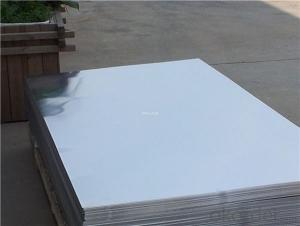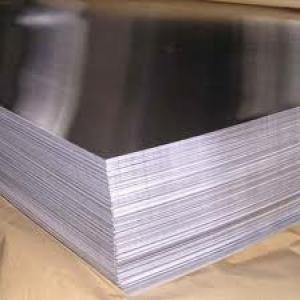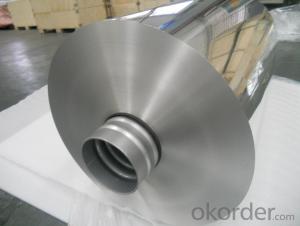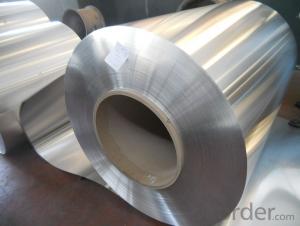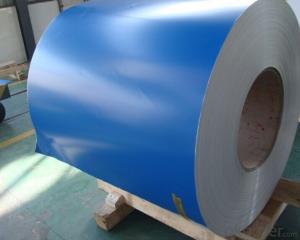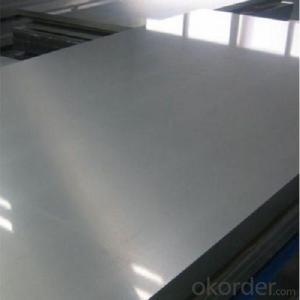Aluminum Sheet Manufactured In China High Quality 1100 3003 5052 6061 7075 Metal Alloy
- Loading Port:
- Shanghai
- Payment Terms:
- TT OR LC
- Min Order Qty:
- 5 m.t.
- Supply Capability:
- 100000 m.t./month
OKorder Service Pledge
OKorder Financial Service
You Might Also Like
Item specifice
Packaging & Delivery
Packaging Details: | Standard export packing or following customer's demand |
Delivery Detail: | Within 20-25days or according to the order quantity |
High Quality and Factory Price Aluminum Coil
Specifications
Grade
| 1000 Series: 1050 1060 1070 1100 1200 1235 etc. 3000 Series: 3003 3004 3005 3104 3105 3A21 etc. 5000 Series: 5005 5052 5083 5086 5154 5182 5251 5754 etc. 6000 Series: 6061 6063 6082 6A02 etc. 8000 Series: 8006 8011 8079 etc. |
Thickness | 0.05~10mm |
Width | <1600mm< span=""> |
Color | Metallic, Solid, RAL or by customer requirements |
Coating paint: | PVDF(Polyvinylidene Fluoride), PE(Polyester ) |
Coating thickness | as per customer’s request |
Gloss | 10-90%(EN ISO-2813:1994) |
Total coating thick | Polyester18~27micron(EN ISO-2360:1995) PVDF27 ~35micron(EN ISO-2360:1995) |
Coating hardness | 2H |
Protective film | PVC film, Colorless transparent or White-black |
Adhesion | 5B (EN ISO-2409:1994) |
Impact resistance | No cracking and peeling (A.S.T.M D2794-1993) |
Flexibility (T-bend) | 0T- 2T |
Temper | H16, H18, H24, H26, H26 |
Certification | ISO9001:2000, CE, SGS |
Coil's standard diameter | 1100mm |
Inner Diameter | 405mm/505mm |
Coil's standard weight | 2000kgs |
Payment | L/C ,T/T |
Parameter
Product | Alloy | Temper | Thickness | Width | I.D(mm) | Application |
Aluminum Coil/Strip | 1050,1060,1070, 1100,1200,1235, 1145,3003,304, 3105,3A21, 8011 | O H12 H14 H16 H18 H22 H24 H26 | 0.2-8mm | 50-2400mm | 75,150 200,300 400,505 (as customers's request) | construction,decoration, automobile,electronic, machinery,boat construction, aeronatics&astronautics, cookware,packing etc. |
Application:
1) Radiator
2) Condenser
3) Insulation Material
4) Construction
5) Decoration
6) Advertisement and market applications
Photos
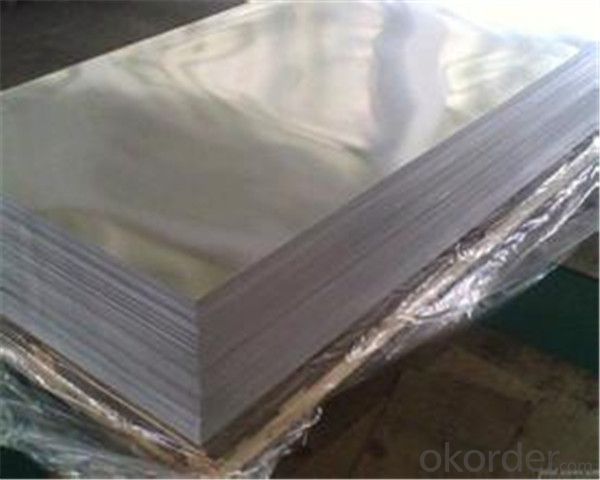
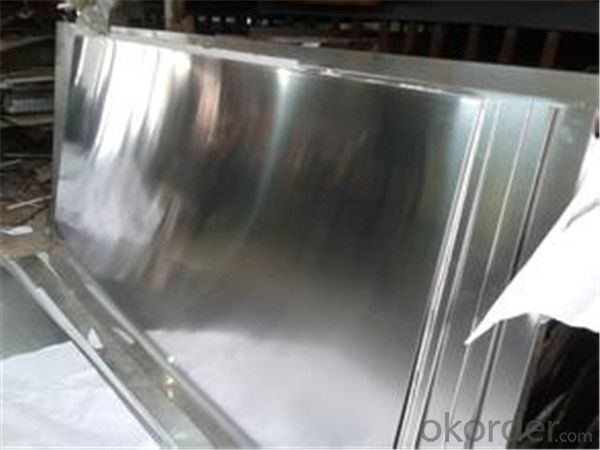
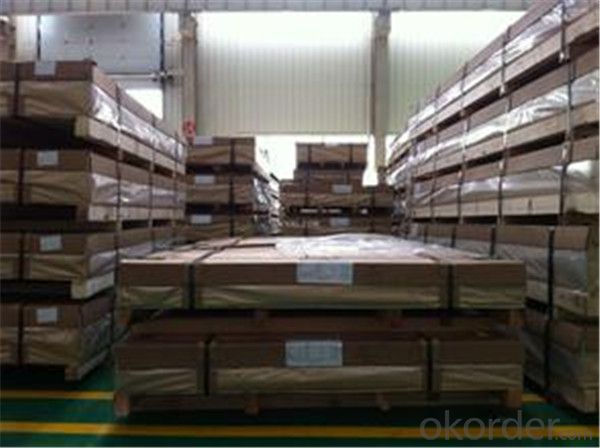
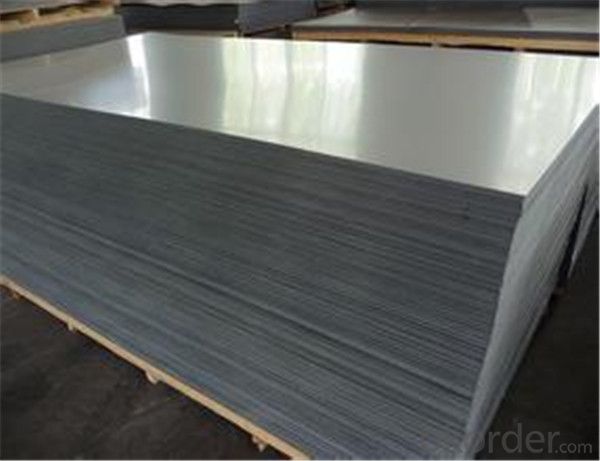
- Q:How does the surface roughness of aluminum sheet affect its performance?
- The overall performance of an aluminum sheet can be greatly influenced by its surface roughness. The roughness of the sheet's surface refers to the presence of irregularities, bumps, and texture. Various methods, such as Ra or Rz, can be used to measure these irregularities. One important effect of surface roughness on aluminum sheet performance lies in its ability to bond with other materials. A smoother surface allows for better adhesion, whether through welding, gluing, or painting. In contrast, a rough surface reduces the contact area and weakens the bond. This is particularly crucial in applications where the aluminum sheet is used structurally or in manufacturing processes that require strong adhesion. Surface roughness also affects the sheet's light reflection capabilities. A smoother surface reflects light more uniformly, resulting in a higher level of reflectivity. On the other hand, a rough surface scatters light in different directions, decreasing overall reflectivity. This property is relevant in applications like architectural cladding, where the desired aesthetic appearance depends on consistent light reflection. Additionally, the surface roughness of aluminum sheets can impact their resistance to corrosion. A smoother surface is less susceptible to corrosion as it provides fewer sites for corrosion to start. Conversely, a rougher surface may contain micro crevices or grooves that can trap moisture, salts, or other corrosive substances, speeding up the corrosion process. Maintaining a smooth surface is crucial in applications where corrosion resistance is vital, such as marine environments or outdoor structures. Lastly, surface roughness affects the mechanical properties of the sheet. A rough surface can concentrate stress, making the sheet more prone to fatigue, cracks, or other mechanical failures. Smoother surfaces distribute stress more evenly, enhancing the sheet's overall strength and resistance to deformation. In conclusion, the surface roughness of an aluminum sheet is of utmost importance in determining its performance. It affects adhesion, reflectivity, corrosion resistance, and mechanical properties. Therefore, it is essential to consider and control surface roughness in various applications to ensure optimal performance and longevity of aluminum sheets.
- Q:Can aluminum sheets be used for automotive heat shields?
- Yes, aluminum sheets can be used for automotive heat shields. Aluminum is a popular choice for heat shields in the automotive industry due to its excellent thermal conductivity and heat resistance properties. It has a high melting point and can effectively dissipate heat, making it suitable for protecting various components from excessive heat exposure. Additionally, aluminum sheets are lightweight and easy to shape, allowing for custom designs to fit specific automotive applications. Overall, aluminum sheets are a reliable and cost-effective option for automotive heat shields.
- Q:What are the different types of aluminum sheets?
- There are several different types of aluminum sheets available, each with its own unique characteristics and applications. Here are some of the most common types: 1. Plain aluminum sheet: This is the most basic type of aluminum sheet, characterized by its smooth surface and uniform thickness. It is widely used in various industries for general purposes. 2. Embossed aluminum sheet: This type of sheet has a textured or patterned surface, which is achieved by rolling the aluminum through a patterned roller. It is commonly used for decorative purposes, such as in interior design or automotive trim. 3. Perforated aluminum sheet: As the name suggests, this type of sheet contains small holes or perforations throughout its surface. It is often used in architectural applications, such as building facades or sunscreens, as well as in filtration systems. 4. Treadplate aluminum sheet: Also known as checker plate or diamond plate, this sheet has a raised pattern of lines or diamonds on its surface. This pattern provides added traction and makes it suitable for applications where slip resistance is important, such as industrial flooring or stair treads. 5. Anodized aluminum sheet: Anodizing is an electrochemical process that forms a protective oxide layer on the surface of the aluminum, making it more durable, corrosion-resistant, and able to accept dyes for color customization. Anodized aluminum sheets are commonly used in architectural applications, signage, and consumer products. 6. Painted aluminum sheet: This type of sheet is coated with a layer of paint, which not only enhances its appearance but also provides additional protection against corrosion. It is often used in applications where aesthetics are important, such as building facades, signage, or automotive parts. These are just a few examples of the different types of aluminum sheets available in the market. The choice of the right type depends on the specific requirements of the project, such as durability, appearance, corrosion resistance, or slip resistance.
- Q:Are aluminum sheets easy to work with?
- Aluminum sheets, in general, prove to be easily manageable. Being a light and flexible metal, aluminum allows for easier cutting, shaping, and manipulation compared to its counterparts. It boasts the ability to be effortlessly bent, formed, and welded, granting access to a variety of fabrication methods. Furthermore, aluminum sheets exhibit excellent resistance to corrosion, which enhances their user-friendliness. Whether the goal is constructing lightweight structures, fabricating components, or crafting intricate designs, aluminum sheets offer versatility and convenience across numerous applications.
- Q:Is aluminum sheet magnetic?
- No, aluminum sheet is not magnetic.
- Q:Excuse me: what kind of aluminum sheet is the cheapest? Which materials are more expensive?
- According to the general arrangement from low to high prices:The first 1 lines are the cheapest, such as 1050.1060.1070..1100, which is pure aluminum;Second, 3 Department prices, such as 3003.3004.3104, etc.. Among them, 3003 for aluminum manganese alloy, the lowest price in the 3 series, and then 3004.3104, for aluminum, magnesium, manganese alloy than 3003 price to be slightly higherThird bit, 5 series, i.e. aluminum magnesium alloy, such as 5005.50525083. 5005 of these prices are slightly lowerThen, the ---2 system and --4 system and --7 system of the 6 series are derived
- Q:Are the aluminum sheets suitable for manufacturing architectural wall panels?
- Yes, aluminum sheets are suitable for manufacturing architectural wall panels. Aluminum is a versatile and popular material in the construction industry due to its numerous benefits. Firstly, aluminum is lightweight, making it easy to handle and install. This is especially advantageous for architectural wall panels, as it reduces the overall weight of the structure, simplifies transportation, and allows for greater flexibility in design. Additionally, aluminum offers exceptional durability and resistance to corrosion. This is crucial for wall panels, as they are exposed to various environmental elements such as rain, UV rays, and temperature changes. Aluminum's natural oxide layer provides a protective barrier, ensuring that the panels remain intact and maintain their appearance over time. Aluminum also provides excellent thermal and acoustic insulation properties. Architectural wall panels made from aluminum can help regulate the internal temperature of buildings, leading to energy savings and improved comfort for occupants. Moreover, aluminum panels help reduce noise transmission, contributing to a quieter indoor environment. Furthermore, aluminum is highly customizable in terms of shape, size, color, and finish. This allows architects and designers to create unique and visually appealing wall panel systems that complement the overall aesthetics of a building. The versatility of aluminum sheets also facilitates the integration of other materials, such as glass or stone, for added design possibilities. Lastly, aluminum is a sustainable material. It is 100% recyclable, and the energy required for recycling aluminum is significantly lower compared to the production of primary aluminum. Choosing aluminum sheets for architectural wall panels aligns with environmentally friendly practices and contributes to the reduction of carbon emissions. Overall, the characteristics of aluminum, including its lightweight nature, durability, resistance to corrosion, thermal and acoustic insulation properties, design flexibility, and sustainability, make it highly suitable for manufacturing architectural wall panels.
- Q:Can aluminum sheets be used for architectural sunshades?
- Indeed, architectural sunshades can make use of aluminum sheets. The lightweight property, durability, and resistance to corrosion have rendered aluminum a favored option for sunshades. Furthermore, its high malleability permits the creation of diverse shapes and designs, catering to the architectural aesthetics. By effectively obstructing sunlight and minimizing heat absorption, aluminum sunshades furnish shade and establish a more pleasant atmosphere. Additionally, aluminum qualifies as a sustainable material, effortlessly recyclable, thus qualifying as an environmentally conscious choice for architectural sunshades.
- Q:Are aluminum sheets suitable for HVAC systems?
- Yes, aluminum sheets are suitable for HVAC systems. Aluminum is a lightweight and durable material that provides excellent thermal conductivity, making it ideal for use in HVAC systems. It is commonly used for making ductwork, heat exchangers, and fins in air conditioning units. Aluminum sheets are corrosion-resistant, which is advantageous in environments with high humidity or exposure to moisture. Additionally, aluminum is a recyclable material, making it an environmentally friendly choice for HVAC systems. Overall, aluminum sheets offer numerous benefits and are widely used in the HVAC industry.
- Q:Are aluminum sheets suitable for electrical busbars?
- Electrical busbars can indeed be made from aluminum sheets. Aluminum is extensively used in the electrical industry due to its exceptional electrical conductivity, lightweight properties, and affordability in comparison to metals like copper. Aluminum sheets can be easily shaped and sized to fit the required dimensions for busbars, making them a versatile choice for electrical applications. Moreover, aluminum possesses commendable thermal conductivity, aiding in the dissipation of heat generated during electrical operations. However, it is crucial to acknowledge that aluminum has a lower electrical conductivity than copper, necessitating larger cross-sectional areas to achieve equivalent electrical performance. Consequently, it is vital to consider the specific requirements of the electrical system and seek expert advice to determine the suitability of aluminum sheets for a particular busbar application.
1. Manufacturer Overview |
|
|---|---|
| Location | |
| Year Established | |
| Annual Output Value | |
| Main Markets | |
| Company Certifications | |
2. Manufacturer Certificates |
|
|---|---|
| a) Certification Name | |
| Range | |
| Reference | |
| Validity Period | |
3. Manufacturer Capability |
|
|---|---|
| a)Trade Capacity | |
| Nearest Port | |
| Export Percentage | |
| No.of Employees in Trade Department | |
| Language Spoken: | |
| b)Factory Information | |
| Factory Size: | |
| No. of Production Lines | |
| Contract Manufacturing | |
| Product Price Range | |
Send your message to us
Aluminum Sheet Manufactured In China High Quality 1100 3003 5052 6061 7075 Metal Alloy
- Loading Port:
- Shanghai
- Payment Terms:
- TT OR LC
- Min Order Qty:
- 5 m.t.
- Supply Capability:
- 100000 m.t./month
OKorder Service Pledge
OKorder Financial Service
Similar products
New products
Hot products
Hot Searches
Related keywords
